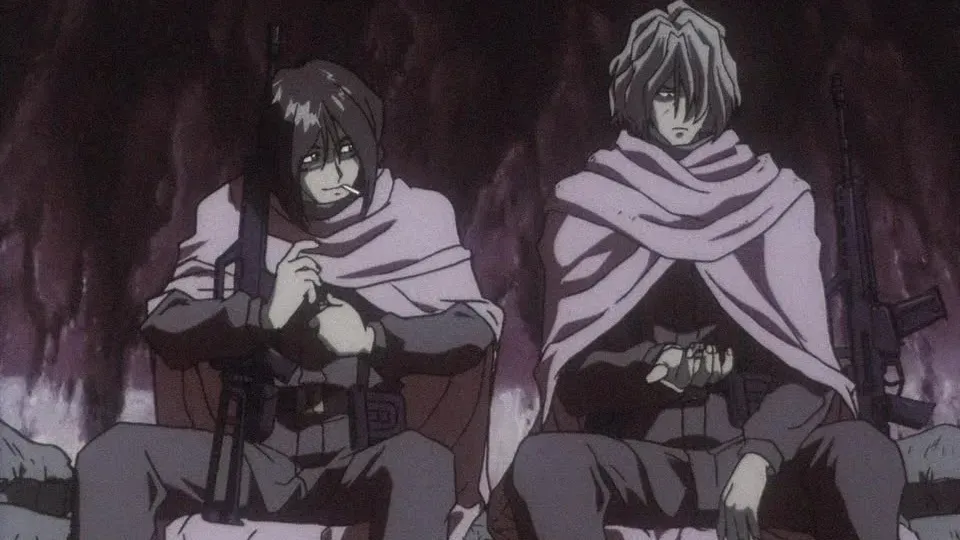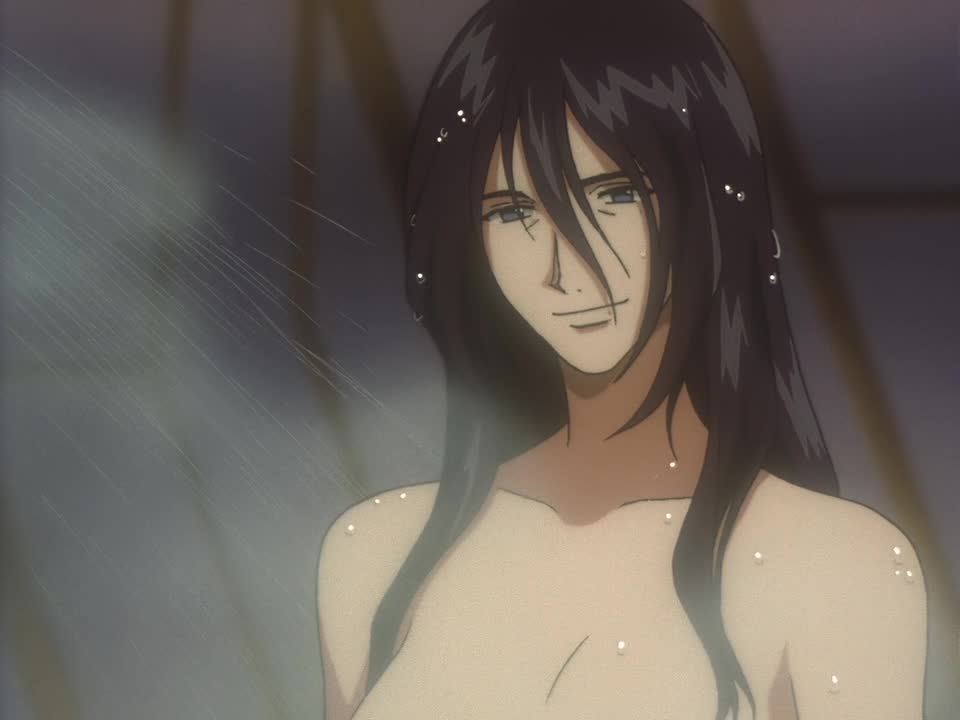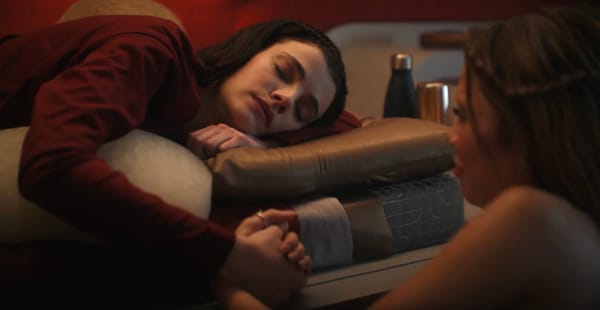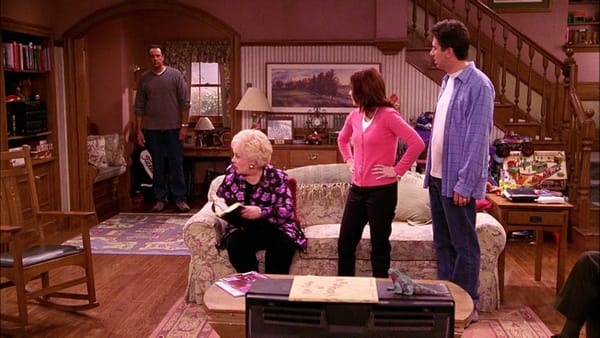Cowboy Bebop: "Jupiter Jazz"
In which it was a different time

(This is the seventh installment of my biweekly recaps of Cowboy Bebop, the TV Tokyo animated series that ran from 1998 to 1999 to cult fascination and critical acclaim. I’ve never seen it! These recaps are only available to paid subscribers.)
- “Jupiter Jazz, Part 1” (originally aired May 22, 1998 [TV Tokyo], January 16, 1999 [Wowow] and October 8, 2001 [Adult Swim])
- “Jupiter Jazz, Part 2” (originally aired May 29, 1998 [TV Tokyo], January 23, 1999 [Wowow] and October 15, 2001 [Adult Swim])

Recently, I appeared on an episode of the podcast Musicalsplaining to talk about one of my favorite musicals ever written: Jesus Christ Superstar. The grandly over-the-top rock opera got me through some of the toughest times of my life, and I wore my cassette tape of my preferred recording down to bits from listening to it over and over and over again. (You should go listen to the podcast episode, too. I had a blast recording it.)
On a Slack I'm in, somebody shared the podcast episode by stating how they were excited to listen to it, even if it was about a musical that was deeply anti-Semitic.
Wait, I thought. Is Jesus Christ Superstar deeply anti-Semitic? But that got me through some of the toughest times of my life! My brain rattled through a billion different arguments as to why the musical wasn't anti-Semitic, and most of them came back to, "Well, it's an adaptation and a subversion of the Biblical tale of Christ's passion." And this is true! Simply by presenting the story of the passion through the eyes of Judas Iscariot, JCS is blunting a lot of the elements in the passion that have been used to fuel anti-Semitism throughout history.
But not all of them, is the thing. What I kept bumping up against in these mental arguments was the fact that, at baseline, the story of Christ's death as presented in the Bible is at the root of almost every strain of anti-Semitic thought we have to this day. And because JCS is adapting the Bible story, even when it's subverting that story, it still features scenes like, say, the Pharisees sneering about how they have to take care of this Jesus already. The production I saw for the podcast blunted the impact of those scenes a little, but it couldn't remove the impact entirely.
The reason I never found an argument in favor of JCS is because there wasn't one. It's an adaptation of a story that is, at baseline, anti-Semitic, and that story is central to my religion (even if my denomination is exploring ways to greatly reduce or even remove anti-Semitic portrayals of the passion in its Good Friday services). You can't get around it. Jesus Christ Superstar got me through some of the toughest times of my life, and it got me to reconsider the religion I was raised in, and many of the songs undeniably slap. And it's also anti-Semitic. It's all of those things.
When I wrote "And it's also anti-Semitic," I felt myself reaching for the conjugation "but." "But" is a word that negates. By using it, I would suggest that all of the good qualities of the work would be wiped out by its ugliest quality. For many viewers, that will be true! However, I think "and" is a better word choice, because it attempts to hold those ideas in conflict. If you reject the work for its anti-Semitism or choose to overlook it because you like other things about it, you're not negating the other half of that equation. Both exist within the whole. Holding those ideas in tension is part of how we can discuss problematic art, especially when trying to see it through the lens of the "different time" in which it was made.
Yes, this is an absurdly long wind-up to say that the "Jupiter Jazz" two-parter is an absolutely brilliant piece of television that left me deeply emotional and reeling, and it contains some pretty vile and horrible transphobia. That transphobia is in keeping with the time in which the two-parter was made. That didn't make it any easier for me to watch as a trans woman.
(Brief sidebar to note that the episodes also traffic in Native American stereotypes in the character of Laughing Bull. I'm probably not the person to speak on those with any authority. If you're interested in further dissection of Laughing Bull, here's a great post from the blog A Tribe Called Geek.)

Believe me, I can feel myself getting annoyed with myself. Shouldn't I just let go of all of these concerns and enjoy two stunning episodes of television? Shouldn't I just be okay with the fact that when Spike goes in search of Julia, he instead finds a "transvestite" named Julius? It was a different time! I love Cowboy Bebop! Why do we have to take everything so seriously?
Yet the scene with Julius kind of sucked me into a black hole, and it took quite a bit of time for the episode to win me back. I can't deny that emotional reaction; I also can't deny that the episode did, in the end, win me back.
Then it promptly lost me again. Enter Gren.
Truth be told, Gren seems like an anti-trans stereotype. Yet I would argue he turns out to be a far weirder, wilder character who actually seems like he stepped out of some late '90s trans erotica posted on Fictionmania. (Were the Cowboy Bebop writers perusing Fictionmania? Shoot me a line, guys! We can talk!) He got hooked on a substance that caused his hormones to go out of whack, giving him breasts and wide hips, while also leaving him with his penis. He describes himself as neither male nor female, in another example of the show presenting a character who might be presented as non-binary in 2022 but who exists within a gender binary that struggles to contain them in 1998. (That this is such a constant fascination of the show is not lost on me. The show's weird presentations of gender crisis are very trans, even as they land in some transphobic places. It's fascinating!)
The best I can say about Julius is that the show treats him as an object of curiosity, rather than derision (though I would argue it does want us to laugh at him a little bit, or at least laugh at Spike's presumed reaction to him). Yet it treats Gren with real sympathy and pathos. Here's a man whose life has been taken from him in myriad different ways, to the degree that even his body seems to have turned against him. And yet he's oddly, passively okay with that. He just has boobs now. It's not a big deal.
Perversely, that makes Gren the show's most intriguing trans metaphor so far. Characters like Ed and VT have a presentation that seems to flummox the others around them, even if they're not that bothered by the fact that their gender identity is not immediately comprehensible to others. In these scenes, it's hard to know whether Cowboy Bebop is excited by the pride with which VT and Ed thumb their noses at the gender binary or if the series takes the side of those who keep asking, "What are you anyway?" The answer is "probably both."
Gren is different. Gren is a presentation of someone whose body has been taken from him. He is not the person he should be, but he's also rather sanguine about it, detached completely from himself, ready to die. He is, in other words, a metaphor for gender dysphoria, at least in my eyes. The presentation of that is also fascinating, because Gren doesn't seem all that bothered by his new physicality. His body just sort of exists. It doesn't matter what happens to it. He's stuck in it either way. That's an extremely dysphoric logic, and it's fascinating to watch a character who seems vaguely detached and dissociated even in the flashbacks to a time when he hadn't yet become the person he is now. In just a little bit of screentime, Gren becomes a character I can read as a fairly profound statement on trans identities.
I'm the one doing all the work here, however. Within the show, Gren's fate is treated as something wild and weird that happened, and the characters who encounter him have sympathy for him but also regard him as an object of horrific fascination. When Faye sees him naked in the shower, it's part of the first episode's massive cliffhanger, and the fact that she can talk to him so openly and freely is subtly suggested to be tied to his essential femininity on some level.
I also want to note here that this episode is made in a cultural context I don't entirely understand. I'm not particularly familiar with how queer people negotiate life in Japan, beyond having talked to a friend who has had to deal with the nonexistent route toward legal recognition of her gender within that country at present. And for my paltry understanding of Japan's treatment of queerness in 2022, I really don't have an understanding of it in 1998.
And yet there's the show's constant, repeated questioning around the idea of being "both" man and woman. I always hesitate to read so-called "egginess" into art, by which I mean I don't want to ascribe a closeted trans identity to an artist simply because themes of gender fascinate them. We live in a world where gender is a kind of straitjacket none of us can escape, and plenty of cis artists have been fascinated by that too.
I struggle to read Cowboy Bebop's gender stuff, however, through a lens other than either abject disgust with gender non-conformity or terrified, thwarted longing for gender non-conformity. The show doesn't mock Gren in the way it sneers at Julius. Indeed, it has a lot of compassion for him. But it also roots that compassion in a kind of pity, and I'm not sure how to square all of that together.
Maybe I'm not supposed to. Maybe the fact that I just spent so much of this recap talking about this tremendous two-parter's presentation of trans issues ended up making this a worse review than it would have been had I ignored the sociopolitical context of the work. Maybe you read all of this and felt the same kneejerk frustration with me that I did with my friend when he talked about the worst things about Jesus Christ Superstar.
I hope you didn't, though. Part of loving something is seeing the places in which it doesn't match up, and in the eyes of this admittedly trans woman, Cowboy Bebop presents a vision of gender that is either too confining for the people who live in its world or not confining enough for those of us who feel comfortable with the gender binary. It's the kind of show where the performance of gender is everywhere but also the kind of show that pretends it's above such a thing, except when it's completely and totally cognizant of same.
That is not to condemn Cowboy Bebop. The "Jupiter Jazz" two-parter is a terrific piece of television. It's just one that kept sending me down the rabbit holes of my own identity. To say that isn't to run the episodes down as "problematic" or indefensible. It's to say that nothing is ever one thing and that amazing art can sometimes have incredibly horrible stuff buried in it. How you weigh those two things in your mind is different for every person. But the important thing is to weigh them in the first place.

Other thoughts I thought:
- Speaking of gender binaries: The fact that Callisto is a colony where there are only men is another example of the ways this show plays around with ideas around gender, albeit in a way that's slightly more familiar than some of its other experiments.
- Would it surprise you to know that after watching this episode, I immediately started playing "Space Lion" (the music cue that plays throughout the end of "Part 2") on Spotify? Would it surprise you to know that I'm still playing it? A great cue.
- I like Faye a little more with every episode, after complaining about her a fair bit back in the day, and I especially like these episodes' willingness to let her play both sides of the "trying to dupe the Bebop crew" and "deeply cares for the Bebop crew" line. As the episode ends, I think I know which side of that line she falls on, but I also might just want her to fall on that line, and that's strong character work.
- Your "the protagonist was just shot and is dying" resolution being "he was just shot with a tranquilizer dart" is kind of weak as a storytelling solution, just saying.
- The final action sequence of this two-parter might be the best chase sequence that the show has done thus far, and I especially liked the payoff to the music box being the trigger for the detonator that takes out Vicious's ship. It's a great way to bring the Vicious/Gren relationship full circle.
- Speaking of Vicious: Spike is in love with him, right? Can I read some fanfic to this effect? I must be able to! (I just checked AO3, and I can! But the Spike/Vicious pairing lags well behind Spike/Faye, Spike/Jet, Spike/Julia, and Spike/reader. Alas!)
- Seriously, the framing sequence with Laughing Bull would be kinda horseshit without the stereotyping within it. It's straight out of those X-Files episodes where Mulder, like, hung out in a trance while Navajo people prayed over him. Very '90s!
- Given how much time these episodes devote to Gren, Lin gets a little shortchanged. But maybe that's worth it, since he turns out to just be cannon fodder within the story. Alas, Lin. We barely knew you.
- Ed is barely in these episodes, though I did enjoy her using Ein as a pillow.
- I had to watch these episodes with the dub for various reasons, and I liked the actors much better this time through. In particular, I really enjoy Wendee Lee as Faye.
Next time: We get some answers as to Faye's whole deal in "My Funny Valentine" and presumably also get some answers as to Ein's whole deal in "Black Dog Serenade."




